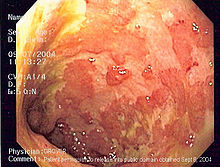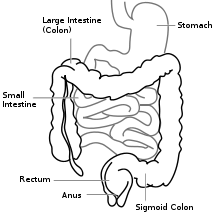Ulcerative Colitis Symptoms
and Signs

Ulcerative colitis symptoms include: diarrhea, bloody stool, fatigue, abdominal pain or cramping after eating or at night time, recurrent periods of illness, fever, malaise, mucus in stool, hemorrhoids, pus, gas, bloating, incomplete emptying, constipation, vomiting, tenesmus, bowel movements at night, toxic dilatation of the colon, severe inflammation in the colon, massive bleeding, skin lesions, weight loss, appetite loss, night sweats, dehydration, tachycardia, 10-20 liquid stools per day, anemia, poor energy.
Children experience similar symptoms along with growth problems and a reduced quality of life.
Definitions
Ulcerative colits: inflammatory bowel disease where inflammation and ulcers (open sores) form in the inner lining of the colon (large intestines) and/or rectum
Toxic megacolon: a rare complication in which the intestinal wall becomes so weak, it balloons out to the point of rupture
Diverticula: mucous membrane lining of the colon wall bulges out into small pouch-like projections
Tachycardia: unusually fast beating of the heart, more than 100 beats per minute
Tenesmus: the feeling that you constantly need to pass stools, accompanied by involuntary straining with little to no fecal output
Malaise: a sense/feeling of general bodily discomfort or unwellness
Colectomy: partial or total removal of the large bowel through surgery
Sigmoid colon: S-shaped lower left section of the large intestine
Contributing Factors to Ulcerative Colitis

Studies show that food allergies,
depression, poor eating habits, and stress worsen ulcerative colitis symptoms.
The cause of colitis is unknown but there has been speculation for
decades about infectious agents such as bacteria. Other possible
causes include the use of antibiotics which kill good bacteria in our
gastrointestinal tract and allow harmful yeast and bacteria to come in. People with Candida albicans or yeast infection symptoms also have an overabundance of yeast fungus in their gut.
Living With Ulcerative Colitis
Depending on the severity of ulcerative colits symptoms, a person could be hospitalized several times a year for 7 days or more. They normally take anti-inflammatory drugs that cause side-effects such as a burning sensation in the intestinal tract, a swollen face, anxiety, weight gain, depression, and joint pain. Some people may also feel stressed about leaving home because a bathroom may not be nearby.
The severity of a persons symptoms ranges from mild (fewer than 4 bowel movements daily with minimal cramping), moderate (4-8 bloody bowel movements daily), severe (8 or more bowel movements daily with anemia, fever, other symptoms), fulminant (10 or more bowel movements daily with severe abdominal pain, other symptoms).
Diet and Lifestyle Changes
Besides treating colitis with anti-inflammatory drugs, immunosuppression or surgery, you can make some lifestyle changes to improve symptoms. A colitis diet and lifestyle changes have shown to dramatically improve ulcerative colitis symptoms with some people going into remission for years. Specifically, supplements in the form of nutrients and herbs are recommended by Nutritional Consultants. The most important nutrients are folic acid, iron (only for those who are anemic), L-glutamine, Proteolytic enzymes plus multienzyme complex with pancreatin, Vitamin B complex plus extra vitamin B6 and vitamin B12, Acidopholus and bifidus probiotics, The goal is to reduce the inflammation that is going on inside the large intestines and rectum. These lifestyle changes include:
Exercise to keep food moving and obtain normal bowel health
Seek nutritional counseling from a certified professional
Join a support group
Keep a daily journal of what you eat and what ulcerative colitis symptoms you experience. Most colitis sufferers are lactose intolerant and can not tolerate dairy products. Corn, excess fats and oils, tomatoes, spicy foods, wheat products, eggs, nuts, citrus fruits, chocolate, and caffeine often cause problems for people with colitis. Also raw fruits and vegetables such as apples, broccoli and cauliflower may be problem foods.
If you are having pain or flare-ups try eating foods that are easy to digest like baby food, also put steamed vegetables through a blender for easy digestion. Also, drink plenty of water to wash out particles that may be caught in the colon, which cause pain.
Related Pages
Photo Courtesy: Samir at English Wikipedia

Popular Articles


